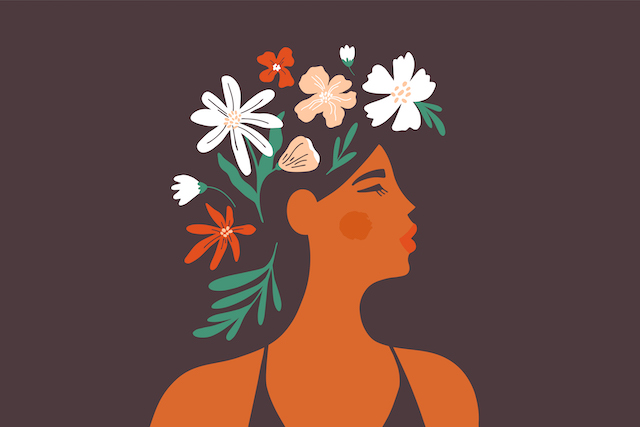
“You are worth the quiet moment. You are worth the deeper breath. You are worth the time it takes to slow dow, be still and rest.” ~Morgan Harper Nichols
“It’s great to see you without three laptops and two phones,” my cardiologist quipped. I nodded, remembering how, a year earlier, I’d sat in the ICU tethered to my to-do list while having a heart attack. Even as the doctors were attaching wires and monitors to me, I couldn’t put my laptop down. I believed that everything would fall apart if I stopped to take care of myself.
It had taken two years—and a lot of work—but I was no longer the same person who’d sat in the ICU, unable to disconnect from work.
“Your EKG looks great,” my doctor announced. “You are perfect!”
“I’m not sure what you are doing, but keep doing it,” he added, after letting me know that my blood pressure was back to its baseline (which, for me, runs lower than average). Not only that, but I could also discontinue several of the medications he’d prescribed after my heart attack.
I’d met him in the emergency room of the local hospital, and thankfully, he recognized that, although I was not clutching my chest and my symptoms were not typical, I was having a heart attack. Just four weeks earlier, I’d gotten cardiac clearance from another cardiologist, so a heart attack hadn’t even crossed my mind.
But come to find out, I had a 90% blockage in my left main artery. A stent was placed, and I dutifully showed up to all my follow-up appointments, though I always hauled my laptops and phones along with me, still unable to disconnect.
As a woman—specifically as a woman of color—I thought I had to carry the world. I had to prove myself. I had to show that I wouldn’t drop any balls, no matter what was going on in my personal life. I always had to be going, doing, striving. I didn’t believe I could just sit, rest, and take time to be.
But with time, and a lot of work, I slowly learned how to take care of myself. I left my corporate career (and a seventy-eight-mile commute) and realized that my priorities needed to shift. Today, I look back at the woman clutching her laptops in the ICU, and I am thankful I am no longer stuck in the place of believing I couldn’t disconnect to take care of myself.
These are the lessons I learned as I healed. If you, too, need to learn how to slow down and take care of yourself, I hope these lessons can help you on your journey.
Sleep
I know that getting at least eight hours of sleep is some of the oldest advice in the book when it comes to taking care of yourself, but it’s also some of the most ignored. How many times have you heard that advice and shrugged it off, thinking, “That’s fine for other people, but it doesn’t apply to me?”
I used to brag about how I could get away with only four or five hours of sleep a night, and while I was technicallygetting away with it, I was doing damage to my body in the process. Sleep is critical.
According to the NIH, “Good sleep improves your brain performance, mood, and health. Not getting enough quality sleep regularly raises the risk of many diseases and disorders. These range from heart disease and stroke to obesity and dementia.” (NIH, April, 2021).
Self-care
It’s taken me a long time to get to a place where I can make time for myself without feeling guilty (as evidenced by the three laptops and two phones I took with me to the ICU), but I’ve finally realized that taking intentional time for myself helps me recharge. That’s nothing to feel guilty about.
Sometimes self-care is as simple as pampering myself with a homemade face mask or taking a relaxing bath with candles. Other times, I splurge on a full spa day. Pushing myself to run on empty doesn’t do anyone any favors—not only is it a quick path to burnout for me, I also am unable to give my best self to my responsibilities if I’m exhausted and drained.
Exercise
I’m not running any marathons, but I’m dedicated to walking daily. Getting my steps in is an easy but effective way to make sure that I’m exercising. I don’t need any special equipment, and I can walk anywhere.
Research shows that even short bursts of walking (like taking the stairs instead of the elevator or choosing to park on the far side of the parking lot) can make a difference. You don’t have to embark on a complicated, time-intensive, or expensive exercise routine to make a difference in your health; just put one foot in front of the other.
New experiences
Life is meant to be enjoyed. Opening yourself up to new experiences changes your perspective. Whether I’m planning a trip to a country I’ve always wanted to visit, or I’m choosing to enjoy a drive on the back roads with an audiobook playing instead of fighting the turnpike, doing something a little out of the ordinary makes me appreciate life more. Next up: I’m planning on taking a cooking class to get out of my comfort zone in the kitchen.
Family time
Whether I’m planning a date night with my husband of twenty-eight years or spending the day with my daughter or my dad, spending time with my family is a crucial part of my well-being. When my mom passed away in June of 2022, the reality that we never know how many days we have left hit me hard. Making the most of the time I have with my family gives my life meaning and purpose.
Learning to meditate
I’d heard about the benefits of meditation for years and had even given it a half-hearted try a few times. But after my heart attack, I knew I needed to figure out a way to clear my thoughts and calm my mind. I gave meditation another shot, and this time, it worked. Now, daily meditation is a key part of my routine, and I’m finally seeing the benefits I’ve heard others talk about for years (like lower blood pressure, better sleep, and less anxiety).
If you feel like you are carrying the weight of the world, like if you stop to take a breath everything will crumble, I’m here to tell you: that’s not true. You can (and should) take time to take care of yourself.
Learn from my lessons before you end up trying to tackle your to-do list from the ICU.
About DeAnna Minus-Vincent
DeAnna Minus-Vincent is dedicated to creating sustainable change in communities and working to eliminate systemic inequities. She currently serves as Founder and Managing Partner of The Outcomes Architect, a strategic advisory firm that works to improve organizational results. A New Jersey native, she is invested in the community and proud to live in Lumberton with her family.













 Though I run this site, it is not mine. It's ours. It's not about me. It's about us. Your stories and your wisdom are just as meaningful as mine.
Though I run this site, it is not mine. It's ours. It's not about me. It's about us. Your stories and your wisdom are just as meaningful as mine.
Who made that art?